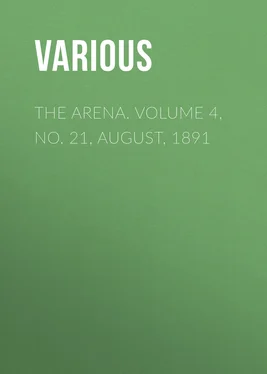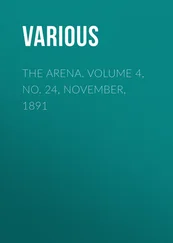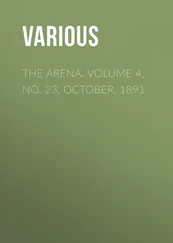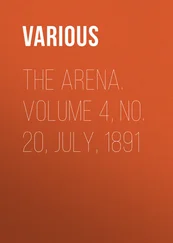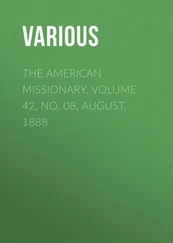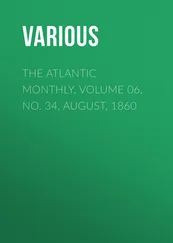Various - The Arena. Volume 4, No. 21, August, 1891
Здесь есть возможность читать онлайн «Various - The Arena. Volume 4, No. 21, August, 1891» — ознакомительный отрывок электронной книги совершенно бесплатно, а после прочтения отрывка купить полную версию. В некоторых случаях можно слушать аудио, скачать через торрент в формате fb2 и присутствует краткое содержание. Жанр: foreign_antique, periodic, foreign_edu, на английском языке. Описание произведения, (предисловие) а так же отзывы посетителей доступны на портале библиотеки ЛибКат.
- Название:The Arena. Volume 4, No. 21, August, 1891
- Автор:
- Жанр:
- Год:неизвестен
- ISBN:нет данных
- Рейтинг книги:4 / 5. Голосов: 1
-
Избранное:Добавить в избранное
- Отзывы:
-
Ваша оценка:
- 80
- 1
- 2
- 3
- 4
- 5
The Arena. Volume 4, No. 21, August, 1891: краткое содержание, описание и аннотация
Предлагаем к чтению аннотацию, описание, краткое содержание или предисловие (зависит от того, что написал сам автор книги «The Arena. Volume 4, No. 21, August, 1891»). Если вы не нашли необходимую информацию о книге — напишите в комментариях, мы постараемся отыскать её.
The Arena. Volume 4, No. 21, August, 1891 — читать онлайн ознакомительный отрывок
Ниже представлен текст книги, разбитый по страницам. Система сохранения места последней прочитанной страницы, позволяет с удобством читать онлайн бесплатно книгу «The Arena. Volume 4, No. 21, August, 1891», без необходимости каждый раз заново искать на чём Вы остановились. Поставьте закладку, и сможете в любой момент перейти на страницу, на которой закончили чтение.
Интервал:
Закладка:
The failure to furnish equipment to do the business of the tributary country promptly is one of the greater evils of corporate administration, enabling officials to practise most injurious and oppressive forms of discrimination, and is one that neither federal nor State commission pays much attention to. With national ownership a sufficiency of cars would be provided. On many roads the funds that should have been devoted to furnishing the needed equipment, and which the corporations contracted to provide when they accepted their charters, have been divided as construction profits or, as in the case of the Santa Fe, Union Pacific, and many others, diverted to the payment of unearned dividends, while the public suffers from this failure to comply with charter obligations; yet Mr. Dillon informs us that the citizen commits an impertinence when he inquires why contract obligations, which are the express consideration for the exceptional powers granted, are not performed.
Another great advantage which would result from national ownership would be such an adjustment of rates that traffic would take the natural short route, and not, as under corporate management, be sent around by the way of Robin Hood’s barn, when it might reach destination by a route but two thirds as long, and thus saving the unnecessary tax to which the industries of the country are subjected. That traffic can be sent by these round-about routes at the same or less rates than is charged by the shorter ones is prima facie evidence that rates are too high. If it costs a given sum to transport a specific amount of merchandise a thousand miles, it is clear that it will cost a greater sum to transport it fifteen hundred; and yet traffic is daily diverted from the thousand mile route to the fifteen hundred one, and carried at the same or lower rates than is charged by the shorter line. It is evident, that if the long route can afford to do the business for the rates charged, that the rates charged by the shorter are excessive in a high degree.
Under government management, traffic would take the direct route, as mail matter now does, and the industries of the country be relieved of the onerous tax imposed by needless hauls. Only those somewhat familiar with the extent of the diversions from direct routes can form any conception of the aggregate saving that would be effected by such change as would result from national ownership, and which may safely be estimated as equal to two and a half per cent. of the entire cost of the railway service, or $25,000,000 per annum.
With the government operating the railways there would be a great reduction in the number of men employed in towns entered by more than one line. For instance, take a town where there are three or more railways, and we find three (or more) full-fledged staffs, three (or more) expensive up-town freight and ticket offices, three (or more) separate sets of all kinds of officials and employees, and three (or more) separate depots and yards to be maintained. Under government control these staffs—except in very large cities—would be reduced to one, and all trains would run into one centrally located depot; freight and passengers be transferred without present cost, annoyance, and friction, and public convenience and comfort subserved, and added to in manner and degree almost inconceivable.
Economies which would be affected by such staff reductions, would more than offset any additions to the force likely to be made at the instance of politicians, thus eliminating that objection; such saving may be estimated at $20,000,000 per annum.
With the nation owning the railways the great number of expensive attorneys now employed, with all the attendant corruption of the fountains of justice, could be dispensed with; and there would be no corporations to take from the bench the best legal minds, by offering three or four times the federal salary; nor would there be occasion for a justice of the Supreme Court of Kansas to render a decision that a corporation chartered by Kansas for the sole purpose of building a railway in that State has the right and power under such charter to guarantee the bonds of corporations building railways in Old or New Mexico, and shortly after writing such decision be carted all over the seaboard States in one of the luxurious private cars of such corporation. Under national ownership such judges would pay their travelling expenses in some other way, and be transported in the ordinary manner, and not half as many judges would travel on passes. There are many judges whose decisions any number of passes would not affect; but if passes are not to have any effect upon legislation and litigation, why are congressmen, legislators, judges, and other court officials singled out for this kind of martyrdom? If the men who attain these positions remained private citizens, would passes be thrust upon them?
Although the reports of the Victorian Commissioners show, in detail, all the expenditures of railway administration, yet not one dollar is set down for attorneys’ salaries or for legal expenses, and it is presumed that the ordinary law officers of the government attend to the little legal business arising, and yet judging from reports made by Kansas roads, the expenditures of the corporate owned railways of the United States for attorneys’ salaries and other legal expenses, are at least two per cent. of the entire cost of operating the roads, and yearly aggregate some $14,000,000, all of which is taken directly from railway users, and is a tax which would be saved under national ownership, as United States district attorneys could attend to such legal business as might arise. This expenditure is incurred in endless controversies between the corporations, in wrecking railways, in plundering the shareholders, in contending against State and federal regulation, in manipulating elections and legislation, and in wearing out such citizens as seek legal redress for some of the many outrageous acts of oppression practised by the corporations. Once the government was in control, these lawyers would be relegated to some employment where they would do less harm, even if not engaged in a more honorable vocation than that of trying to defeat justice by the use of such questionable means as the control of the vast revenues of the corporations place in their hands.
Is it possible that the railway companies can legitimately use anything like $14,000,000 yearly in protecting their rights in the courts?
The president of the Union Pacific tells us that: “The courts are open to redress all real grievances of the citizen.”
There is probably no man in the United States better aware than is Sidney Dillon that no citizen, unless he has as much wealth as the president of the Union Pacific, can successfully contest a case of any importance in the courts with one of these corporations which make a business, as a warning to other possible plaintiffs, of wearing out the unfortunate plaintiff with the law’s costly delays; and failing this do not hesitate to spirit away the plaintiff’s witnesses, and to pack and buy juries—retaining a special class of attorneys for this work—the command of great corporate revenues enabling them to accomplish their ends, and to utterly ruin nearly every man having the hardihood to seek Mr. Dillon’s lauded legal redress, and when they have accomplished such nefarious object, the entire cost is charged back to the public, and collected in the form of tolls upon traffic. Laws are utterly powerless to restrain the corporations, and Mr. Dillon tells us how easy it is to evade them by pleading compliance, when there has been no compliance, and then having the expert servants of the corporation swear there has been.
With the government operating the railways, every citizen riding would pay fare adding immensely to the revenues. Few have any conception of the proportion who travel free, and half a century’s experience renders it doubtful if the pass evil—so much greater than ever was the franking privilege—can be eliminated otherwise than by national ownership. From the experience of the writer, as an auditor of railway accounts, and as an executive officer issuing passes, he is able to say that fully ten per cent. travel free, the result being that the great mass of railway users are yearly mulcted some $30,000,000 for the benefit of the favored minority; hence it is evident that if all were required to pay for railway services, as they are for mail services, the rates might be reduced ten per cent. or more, and the corporate revenues be no less, and the operating expenses no more. In no other country—unless it be under the same system in Canada—are nine tenths of the people taxed to pay the travelling expenses of the other tenth. By what right do the corporations tax the public that members of Congress, legislators, judges, and other court officials and their families may ride free? Why is it that when a legislature is in session passes are as plentiful as leaves in the forest in autumn?
Читать дальшеИнтервал:
Закладка:
Похожие книги на «The Arena. Volume 4, No. 21, August, 1891»
Представляем Вашему вниманию похожие книги на «The Arena. Volume 4, No. 21, August, 1891» списком для выбора. Мы отобрали схожую по названию и смыслу литературу в надежде предоставить читателям больше вариантов отыскать новые, интересные, ещё непрочитанные произведения.
Обсуждение, отзывы о книге «The Arena. Volume 4, No. 21, August, 1891» и просто собственные мнения читателей. Оставьте ваши комментарии, напишите, что Вы думаете о произведении, его смысле или главных героях. Укажите что конкретно понравилось, а что нет, и почему Вы так считаете.
